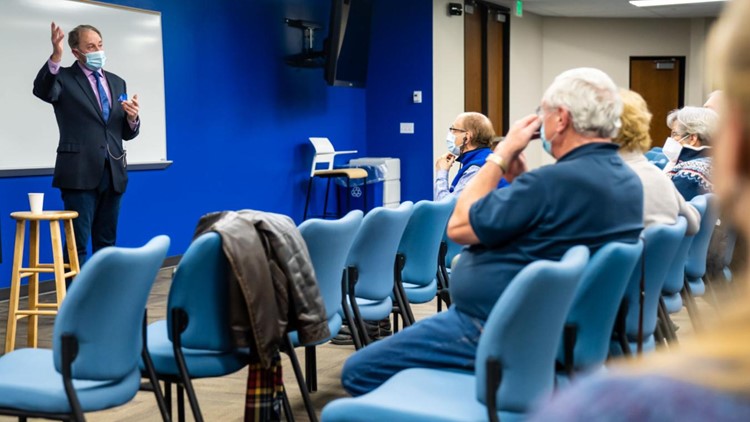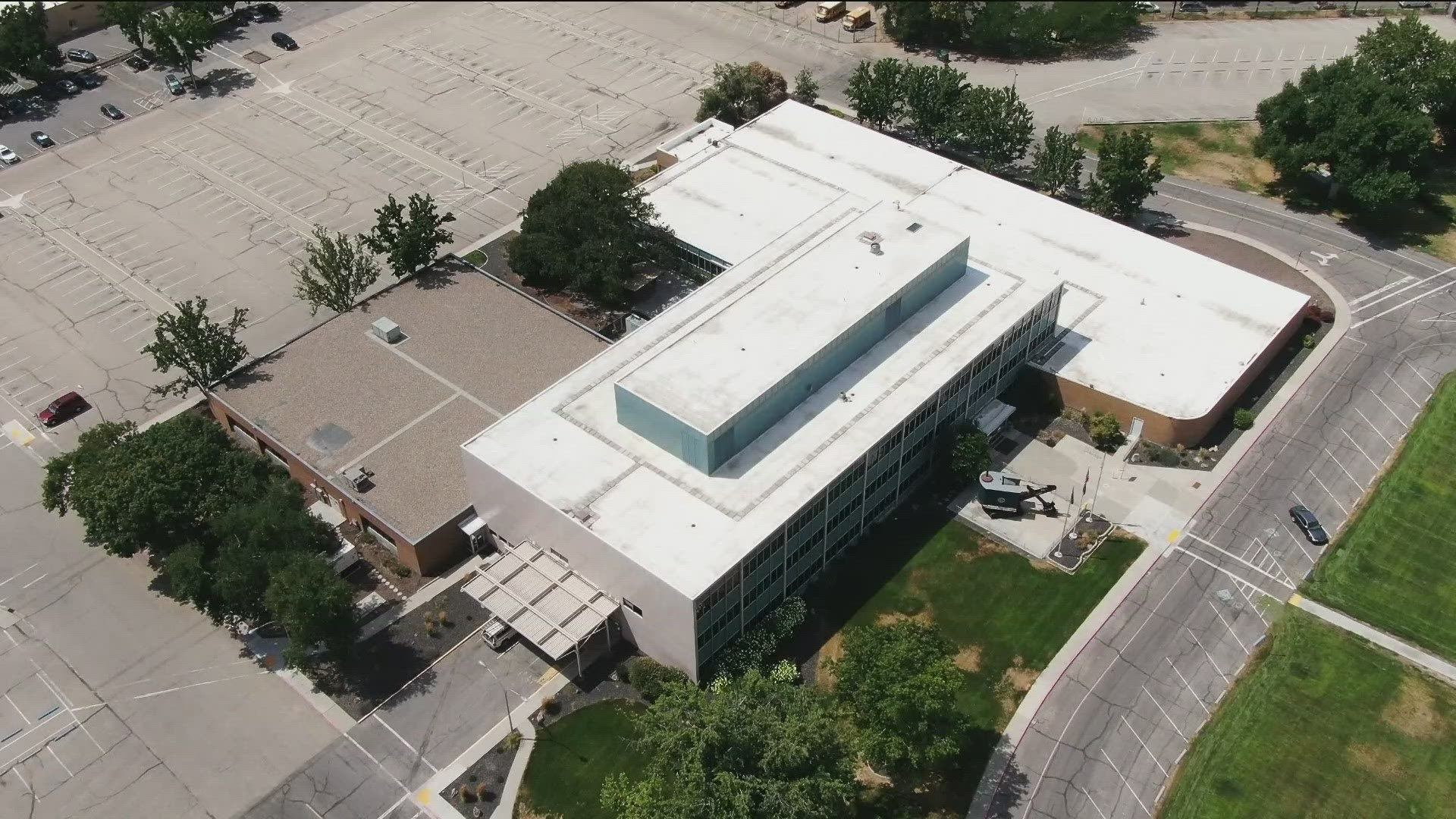BOISE, Idaho — This article originally appeared in the Idaho Press.
Recently, some Idahoans have called for Democrats and independents to crossover and vote in the upcoming Republican primary in an effort to oust far-right candidates. Idaho is a reliably red state, meaning whoever wins the Republican primary in May is the favorite in November’s election.
The GOP primary, which will be held in May, is a closed election, meaning only registered Republicans can vote, so anyone crossing over would have to register as a Republican. Democrats and independents shouldn’t throw their votes to the GOP, argued David Adler, president of The Alturas Institute. The institute is an Idaho Falls-based nonprofit focused on advancing American democracy.
Adler spoke at Boise State University for a City Club of Boise program on Wednesday night about the upcoming primary.
“I understand the fear factor,” Adler said. “The idea of Democrats crossing over is a flawed strategy and a poor bet.”
New legislation was introduced this month that would move up the deadline for unaffiliated voters to change their party registration. Currently, Republicans and Democrats have until March 11 to change their registration but unaffiliated voters have up until election day.
The bill proposes changing the day to March 11 for unaffiliated voters as well.
Officials from both political parties have come out against the idea of crossover voting. Chairman of the Idaho Republican Party Tom Luna said elections aren’t won by gaming the system, and House Minority Leader Ilana Rubel has said the move would ultimately hurt the Democratic Party and lower registration numbers.
“Frankly, if you truly cared about the battle for ‘the soul of the Republican Party,’ you wouldn’t advocate for non-Republicans to infiltrate our party and skew the results,” Luna wrote in November in an Idaho Press guest opinion. “You have to get involved in the political process. That means rolling up your sleeves and doing the hard work of actually working for the candidate of your choice.”
For Adler, the tactic is flawed because moderate Republicans in the Gem State have taken some similar positions and voted similarly on issues as those in the far-right wing of the party.
An example, he said, is the “Add the Words” movement to add “sexual orientation” and “gender identity” to the Idaho Human Rights Act.
The change has been introduced in the Legislature almost every year for the past 16 years; the one time it got a full hearing, it died on a party-line vote.
The Republican Party is the preeminent party in the state and giving the party more votes will strengthen their statewide position, Adler said.
As of this month, 53.6% of all registered voters in the state were Republicans and only 13.6% were Democrats; 31.3% were unaffiliated, according to records kept by the Idaho Secretary of State’s office.
Plus the simple question remains of whether the move is necessary.
Current Lt. Gov. Janice McGeachin is running for governor. Current Gov. Brad Little has not announced he is running for re-election, but has raised more than $1 million for his campaign, according to campaign finance reports.
“Gov. Little is not likely to have any trouble dispatching Janice McGeachin,” Adler said.
And if not? “That’s their choice,” Adler said. “(If) the policies under a McGeachin governorship … turn out to turn their stomachs … would voters not say to themselves, ‘Maybe I don’t want to be part of that party that would elect that candidate.’”
If Democrats crossover, there will be no “day of atonement,” Adler said.
Adler has taught at all three Idaho universities and his writings have been quoted by entities such as the U.S. Supreme Court, according to the Alturas Institute.
The election hasn’t happened yet, so anything can happen, but political party affiliation can become very ingrained.
“The thing about party identification is that it becomes very wrapped up in someone’s identity,” Boise State University research scholar Matthew May said.
Crossover voting can be sincere or strategic, according to May. Sincere crossover voters believe the other side is likely to win and vote for which candidate they would prefer. Strategic crossover voters vote for the candidate they believe their party would have an easier time beating.
“If you’re in a single-party dominant state like Idaho, where once you get through the primary the odds are you know which way the general election will pan out, then the primary election becomes more or less the point you have to influence the outcome of the overall election,” May said.
Republicans have been dominant in the state for decades, so it is perhaps difficult for many to imagine that changing.
However, in the mid-1990s, Colorado, Nevada and New Mexico were more Republican. Luna, the Republican chairman, recently told Politico each of the states were then fast-growing with Republican infighting, similar to how Idaho is now. Colorado, Nevada and New Mexico are now blue states.
Those three states are examples of how urbanized areas tend to become bluer over time, May said.
“We do kind of see that a little in Idaho with Ada County,” May said. “Boise is generally more Democratic whereas you move further west out in Ada County, towards Meridian, Eagle and Star, that’s usually more red. ... Whether or not it’s happening at a rate that necessarily can shift that culture here in Idaho, it’s a little early to say.”
Republican infighting likely will be a part of this year’s election. In particular, McGeachin and Little faced off twice over the course of 2021 because McGeachin signed executive orders when Little was out of state that he then reversed.
Last fall, former President Donald Trump endorsed McGeachin.
At Wednesday’s seminar, City Club of Boise Treasurer Darwin Roy contended Democrats could vote with their party in the fall after voting for the moderate candidate in the GOP primary.
“It does no damage to their vote in the fall,” Roy said. “We know that Republicans are willing to vote for Janice McGeachin … against a very good Democratic candidate.”
Long term, Adler said if McGeachin was elected, voters would associate her candidacy with the Republican Party.
As chairman of the Republican Party, Luna said on Friday that he was comfortable with her on the ballot.
“Janice McGeachin is a long-term Republican. ... If the Republicans choose her as our nominee, she’ll be the next governor. And it will be the Republican Party that will decide if that’s who we want as our candidate,” Luna said. “We don’t need the Democrats to try to come in and save us from ourselves.”
This article originally appeared in the Idaho Press. Read more at IdahoPress.com
Watch more Idaho politics:
See all of our latest political coverage in our YouTube playlist:



